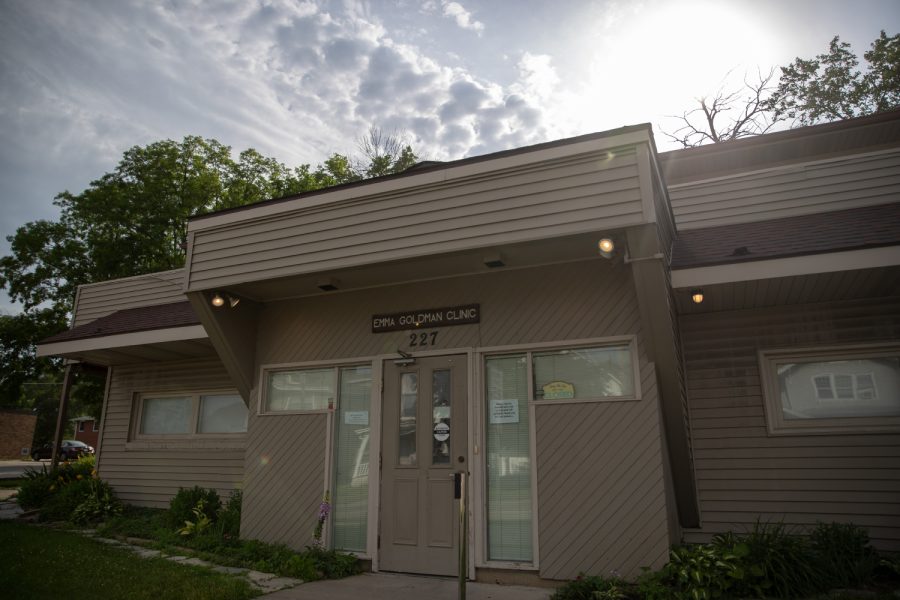Opinion | Reproductive justice discussions need marginalized voices
The media has been filled with stories about how overturning Roe v. Wade could cause exaggerated harm in non-white and LGBTQ+ communities. What’s been missing from a lot of these stories? Community representation in leadership.
The Emma Goldman Clinic is seen in Iowa City on Monday, June 13, 2022.
June 14, 2022
As a predominantly white state, activism in Iowa has always included an element of white saviorism and/or supremacy. The same has been true for media reporting and other public platforms against recent news challenging the security of the 1973 Roe v. Wade decision.
To help marginalized Iowa residents, reproductive justice in the state needs to start addressing the high cost, limited access, along with diversity among providers; and start placing the power of organizing and media publication into the hands of people from these communities who are disproportionately affected.
But overrepresentation of white, straight voices goes beyond the media. Iowa City clinics that advocate for non-white communities are lacking representation within their own staff.
The contexts around reproductive care coverage explain community-held trauma common within all non-white and marginalized groups.
Because of a history of mistreatment in healthcare, many non-white and LGBTQ+ identifying patients are not inherently comfortable when white, cisgender doctors enter the room.
In Iowa City, there are no doctors of color in any of the low-cost or free clinics, a representative of the Emma Goldman Clinic confirmed on June 10. This includes Planned Parenthood, Emma Goldman Clinic, or the free medical clinic.
When medical professionals reflect their patients’ culture, ethnicity, and race, non-white patients feel heard and comforted by those helping them make life and death choices.
Mica Doolan, a local Planned Parenthood affiliate, community organizer, and creator of the Repros for Iowa podcast, provides insight on their perspective of recent reproductive justice conversations happening in Iowa City.
“Abortion is not cheap,” Doolan said. “Going to the doctor for a regular check up isn’t cheap. Many people can’t afford a simple, effective, basic medication abortion yet so many people need them.”
Doolan goes on to explain how this disportionality affects non-white communities.
“A lot of people, specifically non-white and LGBTQ communities have been living in a post-Roe world with restrictions like waiting periods [for abortions or other services], defunding Medicaid and other welfare benefits, the Hyde amendment, gag rules, and more,” Doolan said.
Kennisha Entsminger, an Iowa Planned Parenthood affiliate, recognizes universal healthcare and changes to insurance policies as a solution to making clinics more accessible.
“Allowing state insurance (Medicaid) to cover abortions would overwhelmingly help so many low income people, which is disproportionately filled with non-white,” Entsminger said.
To reassure marginalized communities when our rights to bodily autonomy are being threatened, white, cisgender society must go a step beyond thinking of legal avenues in their problem solving.
Creating safe spaces to ensure positive experiences and confidence in the autonomy a patient has over their own body and reproductive capabilities can look like:
- Avoiding organ first language
“I try not to refer to people just by having uteruses to not have an organ-first/dehumanizing approach,” said Enstminger. “Trans men, intersex people, and nonbinary people receive abortions, get pap smears, can have cervical cancer, amongst a myriad of other services and conditions,”
- Remembering that reproductive care and choices carry stigmas outside of clinical settings
Reproductive autonomy over one’s body and safe emotional spaces include non-judgmental care regarding: number of sexual partners, access to abortion and contraception, preferred labor practices, child raising, familial structure, use of state insurance, lack of insurance altogether, as well as the number of children within a family, and the choice to breastfeed in public.
Allowing Black and Brown people access to reproductive care training at all levels from doctors to doulas could also: help improve the current racial disparity in maternal health, ensure comfort in care, and allow non-white people an opportunity to give back to their communities. The Iowa Black Doula Collective is one organization committed to this goal.
- Making clinics accessible and reliable
Most low — income families which heavily overlaps with other marginalized identities — cannot afford to travel or may not have a vehicle to take them to a clinic that is miles away.
“The solution [I see to inclusive and accessible healthcare in Iowa] is reopening closed clinics, retaining adequate and inclusive staffing at said clinics, and free services,” Entsminger said.
It is not easy to admit the possibility that Roe v. Wade may be overturned this summer. To most, that reality is terrifying. That is, only if you are someone who has benefited from the Roe decision in the first place.
Columns reflect the opinions of the authors and are not necessarily those of the Editorial Board, The Daily Iowan, or other organizations in which the author may be involved.














